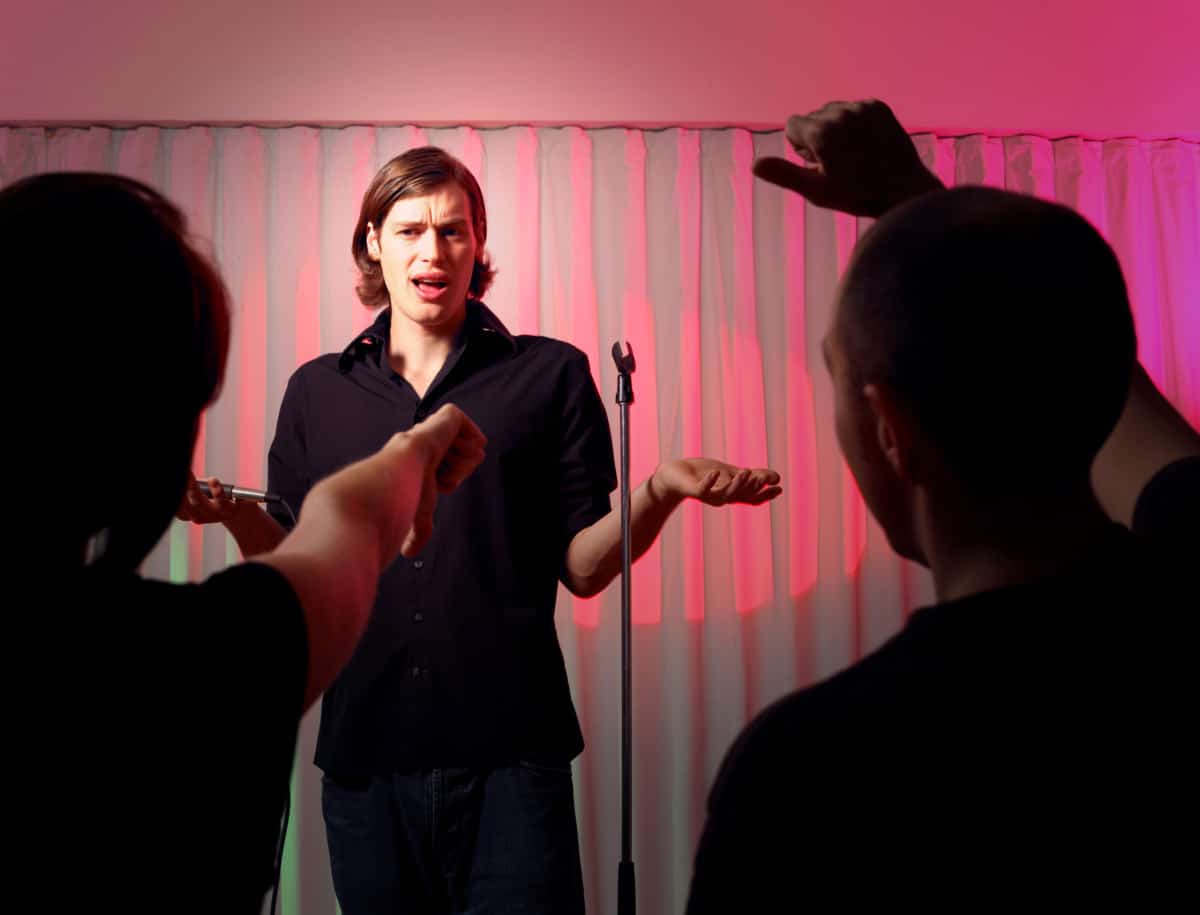Comedy is hard enough without worrying about other comedians stealing your act. It seems like this should be copyrighted material, and there should be laws against stealing material. Sadly, there isn’t any. Many comedians feel your pain on an even grander scale when they see other comedians—some who are even more well-known, profiting off of their jokes and bits.
It’s almost impossible to prove joke theft, and copyright law precedent in this area is pretty weak. The real judge is history and fellow comedians. Joke stealing was a standard tool of the trade in the days of vaudeville. Everyone was telling everybody else’s jokes. It was expected and part of the craft. The notion of “joke stealing” is relatively new and one that only caught steam due to famous comedian and podcaster Joe Rogan calling out Carlos Mencia at the Comedy Store on February 10, 2007.
Stealing VS Parallel Thinking
When joke stealing is brought up often, the defense of those who support the accused and the comedian being accused is “parallel thinking” “Parallel thinking” is the idea in which comedians will logically and unknowingly come up with the same sorts of jokes. Yes, it is a real thing as there are only so many common topics, and because it’s in the culture, common or similar jokes or ideas can be repeated by multiple people. However, it is indefensible when the setup and punchline are so identical that it is almost word for word the same joke. Concepts and topics can be similar and therefore considered “parallel thinking,” but the line for line joke is stealing.
Joke theft is much like plagiarism or any theft of intellectual property. It is a severe accusation, especially to comedians serious about stand up comedy and their livelihood. Patton Oswalt said the problem with joke stealing is that “an uncreative person took a creative person’s work, signed their name to it, and passed it off as their own for their personal glorification, monetary benefit and career advancement.”
This is why people have a problem with joke theft today. Often the uncreative person excels on the back of hard work someone else did. Maybe they will get caught, and perhaps their career will end, but that’s not always the case.
So why is this concept of joke theft a big deal now? Famed comedian Milton Berle was allegedly an unapologetic joke thief and was said to justify his theft by tweaking it or putting his own polish on it. So it seems that at one-time, joke theft was common, rampant, and acceptable. Why is it not anymore?
Jokes Are Jokes
There is a stigma in the creative arts that is often repeated is the quote from Pablo Picasso “Good artists copy, great artists steal.” Sure there are no original ideas, but there are unique points of view, which is where stand up comedy separates itself from other creative arts.
Jokes can take a considerable amount of time to write. In many cases, every word, every pause, and every emphasis is entirely scripted and heavily rehearsed. Inevitably, during a comedy set, there may be some audience interaction and some “fillers” between the rehearsed comedy bits. Still, most bits follow a script to ensure that the jokes are expressed in a particular, predetermined way.
A joke can take a long time to write and even longer to ‘get right.” Comedy is a trial and error process—meaning it often takes weeks, months, and even years to edit a joke down to its best iteration through countless performances. Sure multiple comedians can talk about airplanes and airports, but everyone has a different view.
Just check out these bits by Louis CK, Jerry Seinfeld, and Sebastian Maniscalco.
Sure they all cover the vein of airplanes and airports, but are all the takes the same? No. This is a more basic version of “parallel thinking.” Most people have been on an airplane or to an airport, so the material is relatable.
Why Joke Stealing Hurts The Thief Too
Stealing is wrong, and when a joke thief takes a joke or bit from another comedian, most people think it only hurts the comedian whose joke or bit was taken. Sure at the moment, they are the hurt one, but over time it is the joke thief who ends up worse off.
Finding your Comedic Voice is the longest and hardest part of the comedic journey. The nature of comedy is complicated, as comedy is primarily made up of humorous actions and observations that are not exclusive to one person or their personal experience.
When a new comedian starts out often they are just impersonating their favorite comedian. So what if every bit or joke you have came from someone else? You never wrote a joke or even built your own set; instead, you lifted joke after joke from other comedians. Eventually, you won’t have your own voice or style; instead, you will be a hodgepodge of other comedians.
A joke thief will only be able to steal for so long. Eventually, other comedians will avoid them and may not even perform around them for fear of theft. So the thief will lose jokes, and their career will crash and burn. If they had invested the same amount of time and energy in writing and creating their own voice as they did in stealing jokes, they would be better off in the long run.
How To Stop Joke Theft
Indeed, proving copyright infringement in the creative arts can be an impossible task. Given that many jokes are meticulously crafted and prepared, they are capable of being fixed in a material form either in writing or on an audio file this gives you the ability to date your material if ever needed to go to court over stolen material. But how does a comedian pursue legal action?
According to Jonathan Barnett, professor at USC Gould School of Law, “The claim needs to be predicated on an allegation that the other party copied the expression of the idea — it can’t merely be the idea itself,”. He also added that it’s easier to prove claims about written, rather than verbal, work. Which most stand up comedy falls under.
In addition, Professor Barnett stated that, “not only would the artist need to show that there is either exact replication or resemblance between her work and the second work, the artist also needs to show that that resemblance arises from the fact that the second artist actually copied from the original person’s work.”
One of the best ways to do this is to utilize copyright registrations so you can prove that your material is yours. Most comedians would counter and say this is unnecessary, but the alternative is often your work being stolen. It can be costly, and who knows if you will ever have a joke taken. Some comedians may see this as the best option.
In many cases, comedians usually handle their battles outside the courtroom, which is why people like Joe Rogan and other comedians also act as joke thief police. The most critical people able to combat joke theft are other comedians.Sure you can do like W.C. Fields, who is said to have paid $50 to break the legs of a comedian who stole his jokes, but a better option would be confrontation and talking to the alleged thief. No joke is worth jail, or even worse prison.
The truth is that people will steal. We as comedians have to be willing and able to call out those who poison our community with their blatant and wanton disregard for the hard work put forth by other comedians to create comedy. Trust in your humor and your ability to push past having a joke stolen here or there. Most likely, it won’t happen to you, but if it does try to keep in mind that sometimes we have similar ideas. As long as it’s not verbatim or just the swapping of a few words, it may not be joke theft; it might be that other comedians think just like you.

